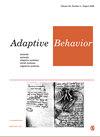Transfer of Recalibration in Perceiving Surface Distance With a Haptic Sensory Substitution Device
IF 1.3
4区 计算机科学
Q4 COMPUTER SCIENCE, ARTIFICIAL INTELLIGENCE
引用次数: 0
Abstract
Studies have shown that, to a large extent, performance of a given perceptual task is independent of the specific sensitivities of the anatomical components used to perform that task. Consequently, the object of calibration—what it is that people become calibrated to when performing a given perceptual task—may be likewise independent of the specific sensitivities of the anatomical components used to perform that task. The experiment reported here used a transfer of calibration paradigm to investigate this hypothesis as well as the more specific hypothesis that the object of calibration is independent of the sensitivity of a given anatomical component to the particulars of a given energy form. In a pretest and posttest, participants perceived the distance of an occluded surface by two different modalities—by exploring that surface with a wooden rod and by doing so with and Enactive Torch, a vibrotactile sensory-substitution device. In a practice session, we manipulated which modality participants used to perform this task (Rod or Enactive Torch) and whether feedback about performance was provided. We found that, when feedback was provided during the practice session, recalibration of perception of surface distance transferred from the rod to the Enactive Torch, and vice versa. This pattern of results is consistent with the hypothesis that the object of calibration in this perceptual task is (potentially) independent of the particular form of mechanical energy generated when exploring the surface.使用触觉替代装置感知表面距离时的重新校准转移
研究表明,在很大程度上,特定知觉任务的表现与用于执行该任务的解剖成分的特定敏感性无关。因此,校准的对象--人们在执行特定知觉任务时被校准的是什么--可能同样与执行该任务的解剖成分的特定敏感性无关。本文报告的实验采用了校准转移范式来研究这一假设,以及更具体的假设,即校准对象与特定解剖成分对特定能量形式的敏感性无关。在前测和后测中,参与者通过两种不同的方式感知被遮挡表面的距离--一种是用木棒探索该表面,另一种是用振动触觉替代装置 Enactive Torch 探索该表面。在一次练习中,我们操纵了参与者使用哪种模式(木棒或 Enactive 手电筒)来执行这项任务,以及是否提供了有关执行情况的反馈。我们发现,当在练习过程中提供反馈时,表面距离感知的重新校准会从杆转移到主动手电筒上,反之亦然。这种结果模式与以下假设相符:在这一感知任务中,校准对象(可能)与探索表面时产生的特定形式的机械能无关。
本文章由计算机程序翻译,如有差异,请以英文原文为准。
求助全文
约1分钟内获得全文
求助全文
来源期刊

Adaptive Behavior
工程技术-计算机:人工智能
CiteScore
4.30
自引率
18.80%
发文量
34
审稿时长
>12 weeks
期刊介绍:
_Adaptive Behavior_ publishes articles on adaptive behaviour in living organisms and autonomous artificial systems. The official journal of the _International Society of Adaptive Behavior_, _Adaptive Behavior_, addresses topics such as perception and motor control, embodied cognition, learning and evolution, neural mechanisms, artificial intelligence, behavioral sequences, motivation and emotion, characterization of environments, decision making, collective and social behavior, navigation, foraging, communication and signalling.
Print ISSN: 1059-7123
 求助内容:
求助内容: 应助结果提醒方式:
应助结果提醒方式:


